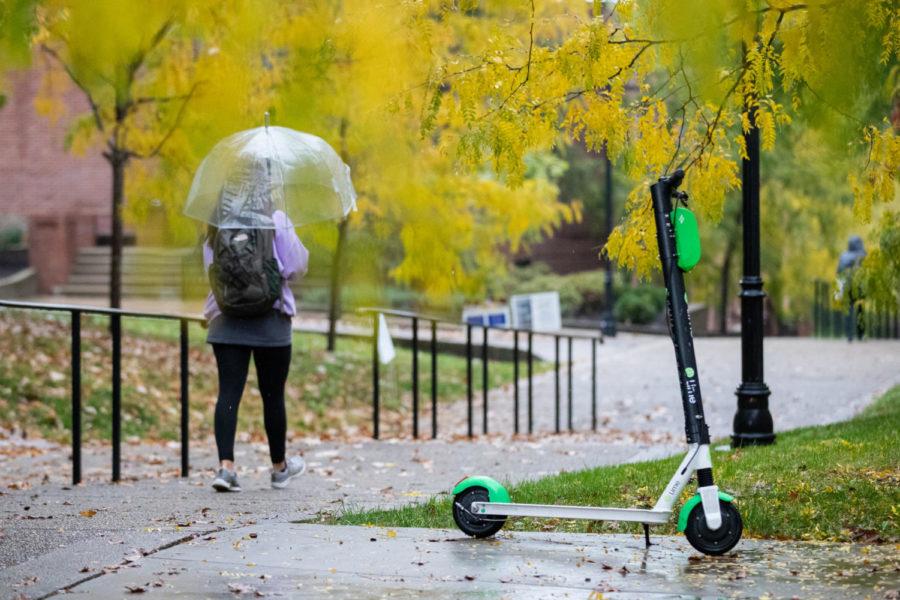Ride-share scooters have hit Lexington. Here’s what UK students think so far.
A student walks by a lone Lime Scooter outside of the UK Science and Engineering Library on Wednesday, Oct. 30, 2019, at the University of Kentucky in Lexington, Kentucky. Photo by Michael Clubb | Staff
October 29, 2019
To the delight of some students and the dismay of others, electric ride-share scooters have permeated UK’s campus for the past few weeks.
The Lexington-Fayette Urban County Council passed an ordinance in June allowing companies to bring scooters to Lexington. Though UK has not yet chosen a preferred vendor, companies Lime and Spin have received permits for their scooters to be ridden in and around UK’s campus. Alternative Transportation Manager Sandra Broadus said that students’ overall reception to the scooters has been “very positive.”
“We’ve been seeing a lot of them being ridden to and around campus,” Broadus said. “I think that people have seen them in other cities and knew they were coming, so everyone’s been really excited about it.”
Because UK has not signed a contract with a preferred vendor, no company has permission to bring scooters specifically to campus. Spin and Lime have received e-scooter parking locations in downtown Lexington, but scooters must be parked at bike racks while on campus.
Broadus said that UK Transportation Services aim to find a company that would provide the best rate for students and employees. Currently, scooters cost $1 to unlock, and the cost per minute of travel varies by company. Students and employees pay via the Lime or Spin app, scanning a QR code on a scooter to unlock it.
“We had a one-year pilot program last year with Spin bikeshare,” Broadus said. “Most of the companies that used to do dockless bikeshare have switched over to e-scooters now because they’re a more profitable business,” said Broadus. “The permits that [Lime and Spin] are applying for with the city are just for one year, and so the city…can review how it went after the first year and decide whether to issue new permits.”
Despite the positive reception, the scooter program still comes with challenges. The scooters are not permitted in campus buildings, and scooters have been left on sidewalks or in plazas instead of on bike racks.
UK Transportation is also constructing a dismount zone between Maxwell Place and the Chem-Phys building to avoid congestion during class changes.
“Some people were expecting [the scooters] to be a problem, and I think if you look for problems, you find them,” said Broadus. “Some people were excited about them coming and have been active users of them and haven’t seen problems.”
Though the scooters are being widely used, student opinions of the program as a whole are still mixed. Freshman Will Sanders said he would not use the scooters “unless [he] had to go somewhere off campus.”
“I don’t have a car, but if it’s only on campus, I’d probably just walk,” Sanders explained.
However, some students, such as freshman Maggie Metzger, are more open to taking advantage of the e-scooters. Metzger said she plans to use the scooters, “especially if it’s colder out.”
Freshman Ellie Quinkert agreed.
“They seem fun, and it’ll get me to class quicker,” Quinkert said. “[My friends and I] should all go scootering.”
Despite these mixed opinions, UK Transportation officials see benefits in the new program.
“They have only been active since Monday, so I think it’ll take a while for people to really adjust,” said Broadus in an interview in mid-October. “Hopefully it encourages more people to step outside of their cars and look at other transportation options… Our goals [are] to reduce traffic congestion, parking issues, and…our campus carbon footprint, so the e-scooters help with all of those things.”
The scooters are proving to be most helpful when navigating UK’s large campus.
“Campus is 800-something acres…so getting to one side of campus to the other is quite a long walk,” explained Lisa Cleveland, communications officer for UK Transportation. “The scooters could come in really useful for that.”
































































































































































